七年级英语下册 形容词副词作业 (新版)人教新目标版
(完整版)人教版新目标七年级下册英语教材目录精选全文

What疑问句
Who疑问句
总之,在这一学年中,我不仅在业务能力上,还是在教育教学上都有了一定的提高。 金无足赤,人无完人,在教学工作中难免有缺陷,例如,课堂语言平缓,语言不够生动,理论知识不够,教学经验不足,组织教学能力还有待提高。在今后的工作中,我将更严格要求自己,努力工作,发扬优点,改正缺点
Animals in a zoo
Why,What,Where疑问句
Because
有关品质的形容词
6. I’m watching TV.
Every activities
现在进行时时态
What疑问句
Yes\No疑问句及简短回答
7. It’s raining !
The weather
现在进行时时态
How疑问句
What疑问句
8. Is there a post office near here?
The neighborhood
There be结构
Where疑问句
表地方的介词
9. What does he look like?
Physical appearance
What疑问句
描写性形容词
选择疑问句
10. I’d like some noodles?
What time疑问句
When疑问句
频率副词
3. How do you get to school?
Transportation
How疑问句
How long疑问句
How far疑问句
4. Don’t eat in class.
Rules
否定祈使句t
5. Why do you like pandas?
最新新编七年级英语下册第二单元讲义重点短语语法归纳及练习新版人教新目标版
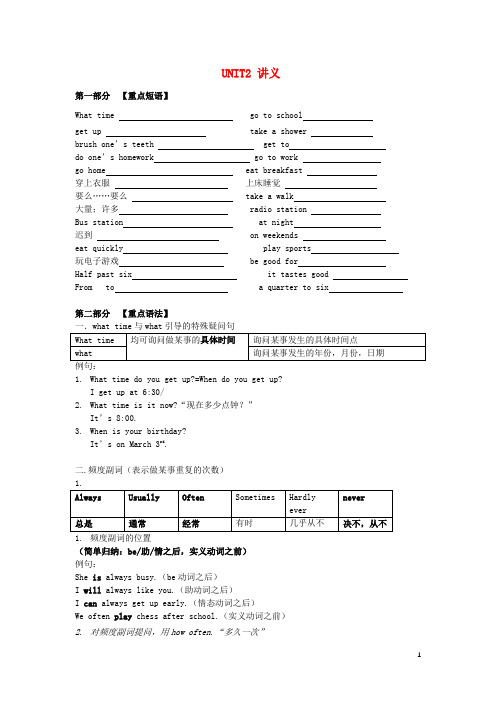
UNIT2 讲义第一部分【重点短语】What time go to schoolget up take a showerbrush one’s teeth get todo one’s homework go to workgo home eat breakfast穿上衣服上床睡觉要么……要么 take a walk大量;许多 radio stationBus station at night迟到 on weekendseat quickly play sports 玩电子游戏 be good forHalf past six it tastes good From to a quarter to six第二部分【重点语法】一.what time与what引导的特殊疑问句例句:1.What time do you get up?=When do you get up?I get up at 6:30/2.What time is it now?“现在多少点钟?”It’s 8:00.3.When is your birthday?It’s on March 3rd.二.频度副词(表示做某事重复的次数)1.1.频度副词的位置(简单归纳:be/助/情之后,实义动词之前)例句:She is always busy.(be动词之后)I will always like you.(助动词之后)I can always get up early.(情态动词之后)We often play chess after school.(实义动词之前)2.对频度副词提问,用how often.“多久一次”-How often do you exercise? 你多久锻炼一次?-I never do exercise. 我从不。
【试一试】1.— is Mid-Autumn Day(中秋节) in China?—It’s August 15th.A.What time; onB.When; onC.What time; inD.When; in2.Do you often go fishing with your father?—No, .I don't like fishing.A.neverB.alwaysuallyD.everyday三.时间表达法整点法:at 6:00 → at six/at six o’clock顺读法:先时钟后分钟的顺序6:20 six twenty 3:45逆读法:先分钟后时钟的顺序①分钟数小于等于30:“past”.表示“几点过了几分” (分钟数+past+时钟)Twenty past one Half past six a quarter past one②分钟数大于30:“to”,表示“差几分到几点”[(60-分钟数)+to+(时钟+1)]Five to six 5:55 ten to six 8:45第三部分综合练习题一. 单项填空。
人教版(新目标)初中英语形容词与副词的比较级与最高级
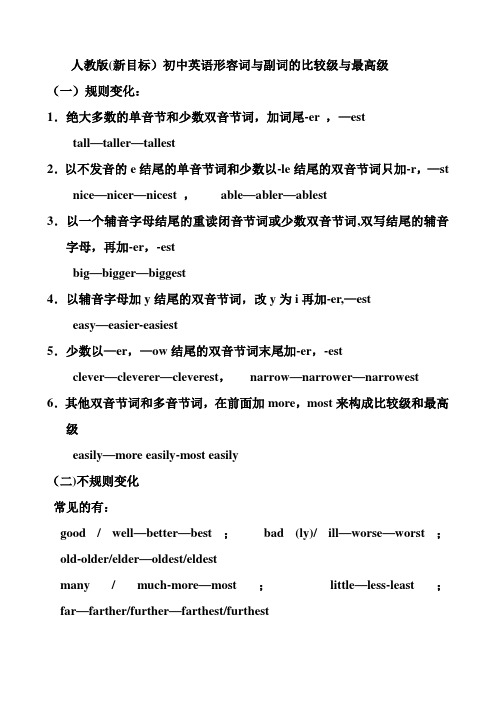
人教版(新目标)初中英语形容词与副词的比较级与最高级(一)规则变化:1.绝大多数的单音节和少数双音节词,加词尾-er ,—esttall—taller—tallest2.以不发音的e结尾的单音节词和少数以-le结尾的双音节词只加-r,—st nice—nicer—nicest ,able—abler—ablest3.以一个辅音字母结尾的重读闭音节词或少数双音节词,双写结尾的辅音字母,再加-er,-estbig—bigger—biggest4.以辅音字母加y结尾的双音节词,改y为i再加-er,—esteasy—easier-easiest5.少数以—er,—ow结尾的双音节词末尾加-er,-estclever—cleverer—cleverest,narrow—narrower—narrowest 6.其他双音节词和多音节词,在前面加more,most来构成比较级和最高级easily—more easily-most easily(二)不规则变化常见的有:good / well—better—best ;bad (ly)/ ill—worse—worst ;old-older/elder—oldest/eldestmany / much-more—most ;little—less-least ;far—farther/further—farthest/furthest用法:1.原级比较:as + adj。
/adv。
+as(否定为not so/as + adj。
/adv. +as)当as… as中间有名字时,采用as + adj。
+ a + n.或as + many / much + n.This is as good an example as the other is 。
I can carry as much paper as you can.表示倍数的词或其他程度副词做修饰语时放在as的前面This room is twice as big as that one.倍数+as+adj。
人教版(新目标)初中英语七年级下册Unit11预习自学
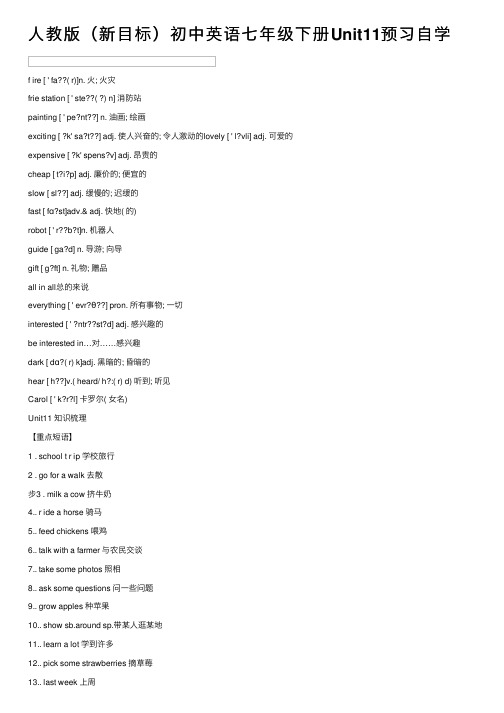
⼈教版(新⽬标)初中英语七年级下册Unit11预习⾃学f ire [ ' fa??( r)]n. ⽕; ⽕灾frie station [ ' ste??( ?) n] 消防站painting [ ' pe?nt??] n. 油画; 绘画exciting [ ?k' sa?t??] adj. 使⼈兴奋的; 令⼈激动的lovely [ ' l?vli] adj. 可爱的expensive [ ?k' spens?v] adj. 昂贵的cheap [ t?i?p] adj. 廉价的; 便宜的slow [ sl??] adj. 缓慢的; 迟缓的fast [ fɑ?st]adv.& adj. 快地( 的)robot [ ' r??b?t]n. 机器⼈guide [ ga?d] n. 导游; 向导gift [ g?ft] n. 礼物; 赠品all in all总的来说everything [ ' evr?θ??] pron. 所有事物; ⼀切interested [ ' ?ntr??st?d] adj. 感兴趣的be interested in…对……感兴趣dark [ dɑ?( r) k]adj. ⿊暗的; 昏暗的hear [ h??]v.( heard/ h?:( r) d) 听到; 听见Carol [ ' k?r?l] 卡罗尔( ⼥名)Unit11 知识梳理【重点短语】1 . school t r ip 学校旅⾏2 . go for a walk 去散步3 . milk a cow 挤⽜奶4.. r ide a horse 骑马5.. feed chickens 喂鸡6.. talk with a farmer 与农民交谈7.. take some photos 照相8.. ask some questions 问⼀些问题9.. grow apples 种苹果10.. show sb.around sp.带某⼈逛某地11.. learn a lot 学到许多12.. pick some strawberries 摘草莓13.. last week 上周14..In the countryside 在乡村15.. visit my grandparents 拜访我的祖⽗母16.. go f ishing 去钓鱼17.. sound good 听起来很好18.. climb the mountains 去爬⼭19 . play some games 玩⼀些游戏20 . visit a museum 参观博物馆21 .visit a f i re station 参观消防站22 . draw pictures 画画23 . go on a school t r ip 去旅⾏24 visit the science museum 参观科技博物馆25.. how to make a model robot 如何制作机器⼈模型26.. gift shop 礼品店27.. buy sth.for sb. = buy sb.sth. 为某⼈买某物28 .all in all 总得来说29 .be interested in...对… 感兴趣30 .be expensive 昂贵的31 .not. . . at all ⼀点⼉也不【重点句型】1 . --- Did you see any cows? 你见到奶⽜了吗--- Yes,I did.I saw quite a lot.我见到了⽽且见到了很多很多2.. --- Did Carol take any photos?罗尔拍照⽚了吗?--- Yes, she did. 是的,她拍了。
(最新版)人教版初中英语形容词副词知识点总结归纳重难点汇总复习资料大全【精品推荐】
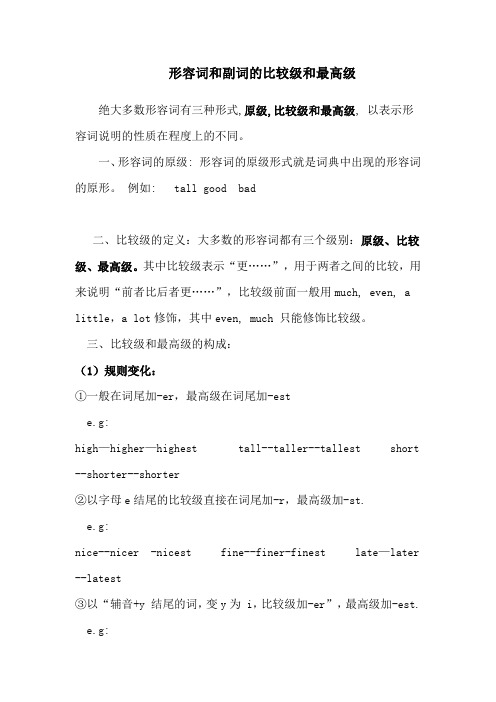
形容词和副词的比较级和最高级绝大多数形容词有三种形式,原级,比较级和最高级, 以表示形容词说明的性质在程度上的不同。
一、形容词的原级: 形容词的原级形式就是词典中出现的形容词的原形。
例如: tall good bad二、比较级的定义:大多数的形容词都有三个级别:原级、比较级、最高级。
其中比较级表示“更……”,用于两者之间的比较,用来说明“前者比后者更……”,比较级前面一般用much, even, a little,a lot修饰,其中even, much 只能修饰比较级。
三、比较级和最高级的构成:(1)规则变化:①一般在词尾加-er,最高级在词尾加-este.g:high—higher—highest tall--taller--tallest short --shorter--shorter②以字母e结尾的比较级直接在词尾加-r,最高级加-st.e.g:nice--nicer -nicest fine--finer-finest late—later --latest③以“辅音+y 结尾的词,变y为 i,比较级加-er”,最高级加-est.e.g:early—earlier-earliest happy—happier-happiest bus y—busier-busiest④以重读闭音节的单个辅音字母结尾的词,双写辅音字母,比较级加-er,最高级加-este.g: big—bigger-biggest fat-fatter-fattest thin—thinner-thinnest hot—hotter-hottest⑤多音节或部分双音节的形容词,比较级在原级前面加more,最高级在原级前加moste.g: popular--more popular—mostpopular important--more important—most important (2)不规则变化:少数形容词的比较级变化是不规则的:good/well—better--best bad/badly—worse--worst man y/much—more--mostlittle—less--least far--farther/further—farthest/furt hest四、比较级的用法:(一)当两个人或事物(A和B)进行比较时,我们需要用到形容词(副词)的原级或者比较级1.表达“A和B一样”,用as…as的结构。
人教版新目标七年级下学期Unit-12--what-did-you-do-last-weekend--知识点

Unit 12 what did you do last weekend?Section A 知识讲解一. last(1)last形容词“最后的,最末的”或者“紧接前面的,刚过去的”。
Today is the last day in the year.最后一天。
I didn’t sleep well last night. 昨晚(2)last副词,“最后地”,I’m the last one.最后一个。
(3)last 动词,“持续,继续,维持”等,The hot weather lasted a week.持续了一周。
二. camp(1)camp 动词,“扎营,搭帐篷”。
We go camping every summer.We walked all day and camped by a river at night.(2)camp 名词,“露营地,度假营”。
Let’s go back to the camp, it’s getting dark. 让我们回营地吧,天黑下来了。
根据汉语提示填空。
(1)When did you join the ______ ______ (夏令营)?(2)I like ______ ______ (去宿营)in the open air.3)We______(宿营)in the forest last night. (4)Let’s go back to the ______(营地)三. sheepsheep 可数名词,“绵羊”,复数还是sheep;goat指山羊。
How many sheep are there on your farm? 你们农场里有多少只羊?拓展:常见的单复数同形的名词还有:deer (鹿),fish (鱼),Chinese (中国人),Japanese(日本人)等。
四. byby介词, “在……旁边”,相当于beside。
Our teacher is sitting by the window.by与交通工具名词连用时,名词前不用冠词,意为“乘、坐、用”等。
人教新目标版2020-2021年七年级英语下册第五单元讲义重点短语语法归纳及练习
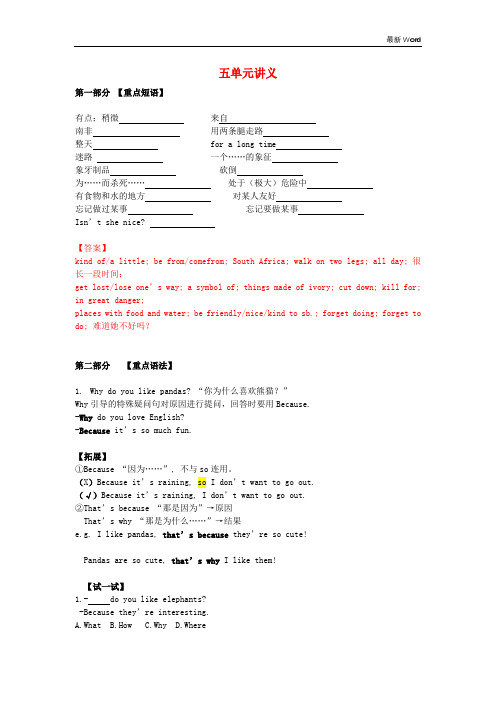
五单元讲义第一部分【重点短语】有点;稍微来自南非用两条腿走路整天 for a long time迷路一个……的象征象牙制品砍倒为……而杀死……处于(极大)危险中有食物和水的地方对某人友好忘记做过某事忘记要做某事Isn’t she nice?【答案】kind of/a little; be from/comefrom; South Africa; walk on two legs; all day; 很长一段时间;get lost/lose one’s way; a symbol of; things made of ivory; cut down; kill for; in great danger;places with food and water; be friendly/nice/kind to sb.; forget doing; forget to do; 难道她不好吗?第二部分【重点语法】1.Why do you like pandas? “你为什么喜欢熊猫?”Why引导的特殊疑问句对原因进行提问,回答时要用Because.-Why do you love English?-Because it’s so much fun.【拓展】①Be cause “因为……”, 不与so连用。
(X)Be cause it’s raining, so I don’t want to go out.(√)Because it’s raining, I don’t want to go out.②That’s because “那是因为”→原因That’s why “那是为什么……”→结果e.g. I like pandas, that’s because they’re so cute!Pandas are so cute, that’s why I like them!【试一试】1.- do you like elephants?-Because they’re interesting.A.WhatB.HowC.WhyD.Where2.I didn’t go surfing it was too cold.A.soB. andC. becauseD.that’s why3. 我迟到了,那是为什么Mr.Su生气了。
新目标(Go for it)版七年级英语下册各单元知识点总结
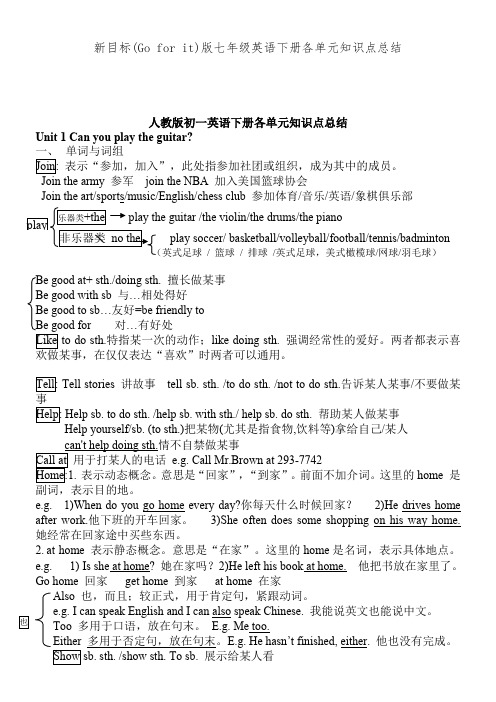
新目标(Go for it)版七年级英语下册各单元知识点总结人教版初一英语下册各单元知识点总结Unit 1 Can you play the guitar?一、 单词与词组表示“参加,加入”,此处指参加社团或组织,成为其中的成员。
Join the army 参军 join the NBA 加入美国篮球协会Join the art/sports/music/English/chess club 参加体育/音乐/英语/象棋俱乐部play soccer/ basketball/volleyball/football/tennis/badminton / 篮球 / 排球 /英式足球,美式橄榄球/网球/羽毛球)Be good at+ sth./doing sth. 擅长做某事Be good with sb 与…相处得好Be good to sb …友好=be friendly toBe good for 对…有好处特指某一次的动作;like doing sth. 强调经常性的爱好。
两者都表示喜讲故事 tell sb. sth. /to do sth. /not to do sth.告诉某人某事/不要做某帮助某人做某事Help yourself/sb. (to sth.)把某物(尤其是指食物,饮料等)拿给自己/某人e.g. Call Mr.Brown at 293-7742意思是“回家”,“到家”。
前面不加介词。
这里的home 是e.g. 1)When do you go home every day?你每天什么时候回家? 2)He drives home after work.他下班的开车回家。
3)She often does some shopping on his way home. 她经常在回家途中买些东西。
2. at home 表示静态概念。
意思是“在家”。
这里的home 是名词,表示具体地点。
- 1、下载文档前请自行甄别文档内容的完整性,平台不提供额外的编辑、内容补充、找答案等附加服务。
- 2、"仅部分预览"的文档,不可在线预览部分如存在完整性等问题,可反馈申请退款(可完整预览的文档不适用该条件!)。
- 3、如文档侵犯您的权益,请联系客服反馈,我们会尽快为您处理(人工客服工作时间:9:00-18:30)。
亲爱的同学:这份试卷将再次记录你的自信、沉着、智慧和收获,我们一直投给你信任的目光……学习资料专题家庭作业:形容词 & 副词一、单选。
( )1. The meat smells . Throw it away.A. wellB. goodC. badlyD. bad( )2. Some animals can even see things in the dark.A. badB. badlyC. clearD.clearly ( )3. The bikes in our shop lookand they sell .A. good; goodB. well; wellC. good; wellD. well; good( )4. The story book is so that I want to read it again.A. interestB. interestedC. interestingD.interests( )5. He is a boy.A. fourteen years oldB. fourteen year oldC. fourteen-year-oldD. fourteen-years-old( )6. The National Day is coming. We can have a _ holiday.A. three-dayB. three dayC. three daysD. three-days( )7. The instructions(说明)on medicine arenecessary(必要的) for the sick. They explainwhether(是否) the medicine is out of date(过期).A. clear; clearlyB. clearly; clearC. clearly; clearlyD. clear;clear ( )8. Lucy’slittle brother is only ten .A. month oldB. months oldC. year’s oldD. year old二、填空。
1.Zhengzhou is a (美丽的) city.2.As a student, we should listen to teachers .(careful)3.Most people prefer (更喜欢) days because they canenjoy themselves outside. (sun)4.When someone hurts(伤害) us, we should write it in the sand andwinds can erase(清除) it away . (easy)5.Rose isn’t. she likes to stay at home and watchTV.(outgoing)6.Be (care) when you cross the street.7.Our government is trying to make sure the students take schoolbuses . (safe)8.If you sleep at night, you can work or learn betterin the day. (good)三、阅读理解。
Dear grandpa, May 27, 2012 (直接)细节理解题第一篇I’d like to tell you something about my life in China. During weekdays, I study in a middle school in Shanghai. We have Chinese lessons in the morning and I do my homework in the evening. On weekends, I stay with a Chinese family, do Chinese kung fu and visit interesting places.Today my Chinese father is busy working on the computer, and my Chinese mother is doing some shopping in the city center. I’m sitting in the park now. It’s a lovely day here. I hope you and my grandma are having a good day in Toronto, too.Love, Betty ( )1. Betty wrote about her life in China to .A.her Chinese parentsB. her grandfatherC. her own parents( )2. In Shanghai, Betty did her homework .A. in the morningB. in the eveningC. on weekends( )3. While Betty was in the park, her Chinese motherwas .A. doing some shoppingB. sitting in the parkC.working on the computer第二篇( )1. The match is between Brazil and .A.ArgentinaB. ChinaC. GermanyD. Japan ( )2. If Marry wants to be the assistant, she can phone the number .A. 833059B. 383539C. 383359D. 330859 ( )3. Where is Jiuzi Square?A.It’s by Longwo Lake.B.It’s in Biguiyuan village.C.It’s far from the city.D.It’s in the center of the city.( )4. You can watch the dolphin show _.A. at 9:30 am, WednesdayB. at 10:00 am, MondayC. at 1:00 pm, ThursdayD. at 11:30 am, Tuesday ( )5. With 24,000yuan, Mr. Green can rent the house for.A. 2 yearsB. one yearC. 10 monthsD. 13 months第三篇Do you learn from your mistakes? I hope so. But have you ever made the same mistake twice? I have sometimes I make the same mistake three or four times!Sometimes, good things happen because of mistakes. Once I got on the wrong train. That was a big mistake .But on that train.I saw a good friend I was so happy I made that mistake!Another time I ruined(毁掉) a surprise. My mother planned a surprise party for my father. She told me it was a secret. But I was just a little boy and I couldn’t keep the secret. I told my father about the party.At first, my mother was mad at me. But then my father said he was happy he knew about it. He said he didn’t like surprises. ( )1. The boy saw on the wrong train.A. his friendB. his fatherC. his motherD. histeacher ( )2. His motherasked him to .A.plan a surprise partyB.tell his father about the partyC.keep a secret about the partyD.invite his friends to the party( )3. What does the boy think of mistakes?A.Mistakes are not welcome.B.A mistake is a terrible thing.C.All mistakes mean happy accidents(事故).D.Sometimes a mistake can be a good thing.家庭作业参考答案一、单选。
1—5:DDCCC6—8:AAB二、填空。
1.beautiful2.carefully3.sunny4.easily5.outgoing6.careful7.safely8.well三、阅读理解。
第一篇:BBA第二篇:ACDAB 第三篇:ACD。
